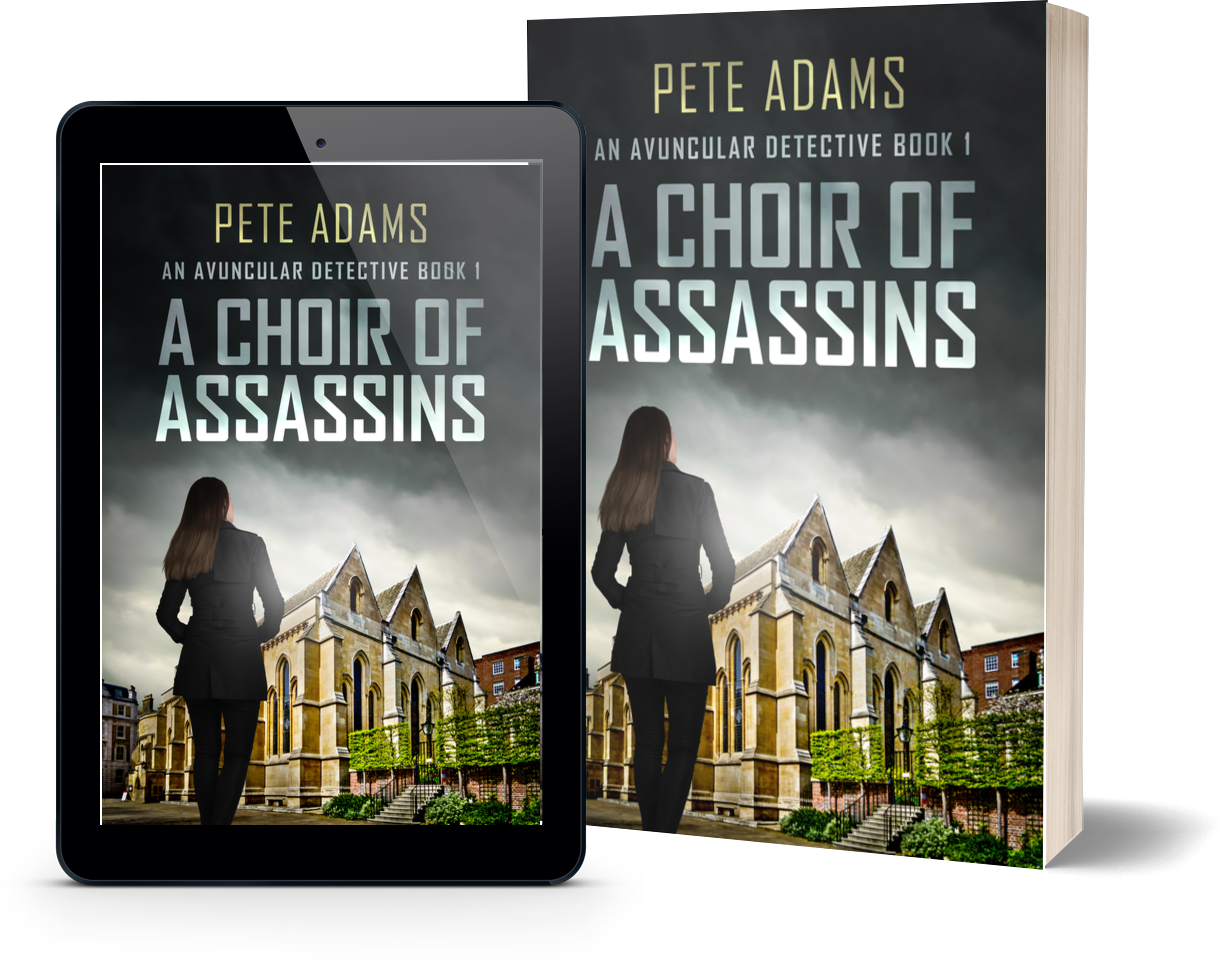A Choir Of Assassins (An Avuncular Detective Book 1)
Book summary
In "A Choir Of Assassins," a web of intrigue unfolds as former Detective Inspector Cherry Clarke is drawn into a series of baffling murders and conspiracies. When high-ranking officials and a notorious gang face deadly assassinations, Cherry, aided by allies from Scotland Yard and MI5, investigates the enigmatic ties that bind these crimes to the Royal Peculiar. But when a personal request from Professor Violet Smith enters the mix, Cherry finds herself navigating treacherous waters in this gripping mystery.
Excerpt from A Choir Of Assassins (An Avuncular Detective Book 1)
A quick death. Time enough. Enough time and, it was their time. It had been a long time. Too long a time and, it was about time. They had bided their time and now, it was time, their time.
Soft shoes on ancient stone flooring. Stones inscribed with the names of Knights dating back to mediaeval times, long before the purge in 1307 drove the Order underground. It would be easy to argue the Order became stronger because of this enforced secrecy and, to ensure that Hegemon survived and prospered, each of the Seven Officers did not formally acknowledge each other in these identities. A veiled anonymity was considered natural, and a necessity historically, and continued today; it was tradition.
Hubris? Confidence born of arrogance? Human nature can blind. The observant, looking on, will see there are always cracks, and you can look through cracks, can’t you?
When the Seven met, they would meet at the Temple Church, a church built by crusading monks in the twelfth century, situated between Fleet Street and the River Thames in London. For centuries it has nestled within the tight cluster of Barristers’ Chambers to the Inner Temple and Middle Temple, two of the four London Inns of Court, the professional association for Barristers in Great Britain. The organisation of the Seven had been meeting since the church had been consecrated in C.1185. They would meet within the circular building known as the Round Church – it was a Royal Peculiar.
Historically, as a Royal Peculiar, this church and its Officers were exempt from the jurisdiction of the Diocese and the province in which it resided, which was, The City of London. Distinct from Greater London, the City was the business district these days; the money men, and some women, worked here. It was known as the Square Mile. The Temple church, as a Royal Peculiar, was subject only to the direct authority of the King or Queen of England, and this was important to the Order, essential, and it still enjoys this privilege today. The Monarch? Well, they created the Crown. The Crown was their own, in so much as they sprung from the Royal Ascendancy; at least, they did. These would be the moneyed haute monde, their wealth not new born, oh no; they had their place by hereditary right. Others, the disdained, they had argent; money.
Historically, or traditionally, the entitled became titled; nothing changes. Nothing is allowed to change; tradition again, and Britain is all about tradition, is it not?
Historically, money bought titles and, as a consequence, you became entitled, at least this is what the current aristocracy believed, although many brutally bullied, stole or conquered, in order to achieve their sense of right of ownership, their position in, The Nobility. The Aristocracy was, in truth, all about smash and grab, and keep at all costs, and all made acceptable by longevity. In other words, if your family survived and was favoured by the Monarchy, they had credibility. They became the Establishment. They were, as much as anyone could be, bullet-proof, even more so if they had the protection of a Royal Peculiar.
Although as personages they would be well known, having conspicuous power, and flaunted their wealth and entitled position, all in the best possible taste, naturally, anonymity of Hegemon was considered a prerequisite for the Seven, and this was preserved throughout the Order, even when the Seven met. Of course they knew each other and would recognise voices, but when they met, they preserved the ancient rites of anonymity, because this was not about them. It was about the Order, which was about God, the Absolute Being and his representative here on earth. They could be identified when in their guise, only by a signet ring on the right hand, the pinkie finger, worn these days only ceremonially. Otherwise, the Seven were caped in monk's simple hooded cloaks, faces masked, proffering a powerfully ghostly visage.
They knew each other because they came from the noble select few; however, the levels of strata below, apart from Squires and Esquires, never knew who the true Officers were, and they never asked. It was an innate trust, and you abided by that. No questions asked. It was how the British system of governance was established, by The Establishment. Only one person knew formally the identity of the Seven, and that was: Number One – The Absolute Being – who represented, here on earth, The Mystery of God; Universal life force – the power of life or death.
A midnight meeting had been called by Officer Seven, the Guardian.
As the clock struck midnight, the Guardian arrived to find the Round Church dark and deserted. The only illumination provided by two robust and tall altar candles, their flickering half-light creating a heavenly atmosphere. The Guardian loved the church like this, it made his divine rapture total, and he embraced it. This was Templar, Seventh Heaven. The highest heaven, where God and His most exalted Angels dwelt. This was their Dominant Dominion, where the Officers exercised their pre-eminence over all others. It was a heady atmosphere, but one the Guardian had been raised for, yet still he was, as always, exhilarated. This was Hegemon, and he was the Guardian of Elysium – Seventh Heaven.
Soft shoes shuffled. Another ceremoniously garbed Officer approached. The Guardian spread his arms in traditional greeting, the act of trust and supplication causing his simple dun cloak to open and reveal the white undershirt with the trade mark red cross. The intersection of the blood-red cross covered the heart, the heart the stiletto expertly pierced. The Guardian stood motionless. From beneath the Guardian’s mask emanated a muffled sound of bewilderment. He did not register pain, but was aware of a gentle gurgle from his throat as blood seeped through the mouthpiece of the Earl of Montmorency’s mask.
There was a haunting whoosh from the robes as the Guardian dropped to the floor and died beside the stone effigy of William Marshall, one of the most violent and yet celebrated men of the Middle Ages. He had been the Royal Defender of the Faith and the first Number One, the first Absolute Being; God the Father, and Defender of the Order.
Soft shoes shuffled away, job done. The old iron key retrieved from a deep pocket and the lock in the heavy door effortlessly turned to allow entry to the wet team of nuns from the Order of Clemence, their convent was nearby. They were permitted entry to do their job while the assassin melted into the deserted dark lanes of the Inner Temple.
The Guardian had considered himself anonymous. He had considered himself secure. He had considered himself, safe. He wasn't, and he had had no time to warn the remaining six of the Seven.
All had gone to plan:
I said oh Black Betty, bam-a-lam
Whoa, Black Betty, bam-a-lam
Violet had the look of an elderly bag lady, wrapped in an old mac, a constant she wore always, despite the summer heatwave; as if it was her security blanket. She sported also a crushed, deep green, narrow brim, Tyrolean trilby style hat with a wonky, verdant green feather, set on her grey haired wizening head, set at a rakish angle; a symbol of a racy past? Beneath the mac she wore green and brown tweed, a skirt and jacket, the ensemble finished off with a billowy cream silk blouse. She wore knitted stockings and sensible suede shoes; Hush-Puppies. Her narrow skeletal face, incongruous on a body that looked that at one time had been trim but now leaning to plump, had an intelligence you had to look for and, once found, was difficult to ignore. It radiated a menace; that should have been a warning. There was history wrapped up in Violet Smith’s face. An experienced visage that said she would take no prisoners; she didn't, and she never had. The life of academe had done little to soften the underlying ruthlessness of this retired Professor of Geology at the University of Portsmouth, but now, she was in court. A victim?*
*Read – A Blood Sport – Wigs on the Green – Book 3 of the DaDa Detective Agency.
Witch dressed the part and lived the part; she was the part. A PTSD-suffering Marine Commando veteran of Afghanistan and other, not-so-well-known conflicts. Ruth Witchel had been a decorated colour sergeant. Now, she was on the streets, forgotten and discarded by a government concerned only for themselves and their sponsors. This government ruthlessly pursuing a programme of austerity that was killing the people they were supposed to represent, charged to protect. That was okay, though, because when people are in survival mode they do not see what is happening in front of their very noses, blaming who they are told to blame by a complicit media.
Someone had to do something because it looked like the powers that be, and all its levels of authority, truly had a vice-like grip on the Governance of this Sceptred Isle; this earth of majesty that the Establishment considered their own, by historic Right.
Kindness was rare for the discarded on the streets of Portsmouth. There had been Sister Blende, a nun, but dressed in ordinary clothes. You wouldn’t know she was a sister, her language as ripe as she was used to hearing in her regiment, but it made Witch feel cared for at least, but… There is always a, but… The sister seemed to be grooming her, there was something more; it was an intuitive thought that had proved accurate. However, what did Witch care.
Ruth had been nicknamed Witch in her regiment and not because her name was Witchel, although this was the prevailing thought. Her call sign was Witch because she had a mysterious ability to get under your skin. She possessed a depth to her intellect, and a canny ability to kill. Ruth Witchel, Witch, was ruthless.

















Praesent id libero id metus varius consectetur ac eget diam. Nulla felis nunc, consequat laoreet lacus id.